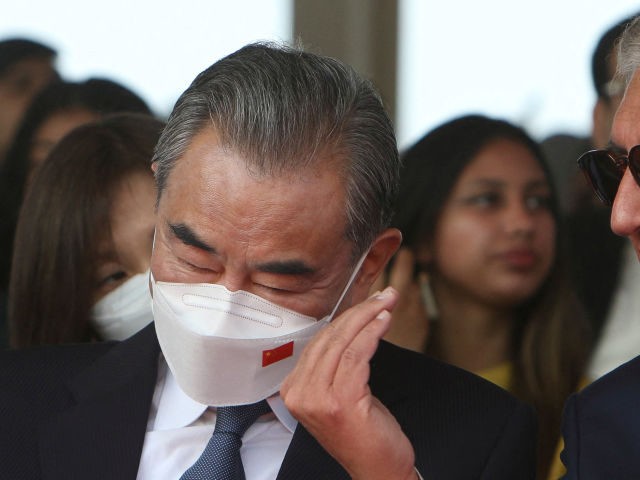Chinese Foreign Minister Wang Yi landed in Kabul, Afghanistan, on Thursday to meet with senior Taliban officials, a sign of approval that Taliban leaders expressed hope would yield significant economic benefits to them.
Wang had previously traveled to Islamabad, Pakistan, to attend this week’s meeting of foreign ministers of the Organization for Islamic Cooperation (OIC). Host country Pakistan and fellow member nations welcomed China warmly despite the fact that the Communist Party is currently committing genocide against Muslim-majority ethnic groups in a region that borders both Afghanistan and Pakistan.
At that event, Wang called for the world to embrace “Islamic wisdom to solve contemporary hotspot issues.”
The Chinese Communist Party has enthusiastically embraced the Taliban’s return to power since former Afghan President Ashraf Ghani fled the country in August, leaving a power vacuum the jihadist organization filled. China has used its position at the United Nations and other international venues to encourage the United States and other Western countries to spend money on ensuring the Taliban’s successful establishment as the government of Afghanistan. China has not, however, recognized the Taliban as the formal government, instead referring to it as an “interim” or “caretaker” government.
No state actor has recognized the Taliban as the legitimate government of Afghanistan at press time, though several, prominently including China, have openly collaborated with Taliban leaders.
The Taliban’s Bakhtar News Agency published video images on Thursday of Wang landing in Kabul, greeted upon landing by the Taliban’s top diplomat, “Minister of Foreign Affairs” Mawlavi Amir Khan.
Inamullah Samangani, the Taliban’s official deputy spokesman, published an extensive statement detailing conversations Wang and senior Taliban leaders engaged in on Thursday in a thread on Twitter.
According to Samangani, Wang met with Taliban “deputy prime minister for economic affairs” Abdul Ghani Baradar and several “high-ranking officials of the Islamic Emirate,” the Taliban’s formal name for itself, to discuss “trade, transit, and economic relations.”
“We are committed to sincere cooperation with the People’s Republic of China, and ensuring peace and security in Afghanistan means peace and stability in the region,” Baradar reportedly said.
Samangani relayed that Baradar expressed particular enthusiasm in China investing in Afghan mines – Afghanistan is one of the world’s richest countries in rare-earth metals, pivotal for electric cars and green energy projects – and participating in China’s Belt and Road Initiative (BRI). The BRI is a global infrastructure project in which China offers poor countries predatory loans to be used to pay China to build ports, roads, and railways. When the countries cannot pay the loans back, China seizes the infrastructure sites – and the land they are built on.
Taliban officials also allegedly expressed interest in “green” energy initiatives like solar, wind, and hydroelectric power. Taliban officials have repeatedly claimed to want to participate in expanded projects against climate change. Shortly after taking power in August, Taliban “cultural” official Abdul Qahar Balkhi asserted that “climate change need[s] the collective efforts of all,” and the Taliban wants to join global efforts against it. Similarly, in November, a Taliban spokesman urged more climate change action in Afghanistan.
“Afghanistan has a fragile climate. There is need for tremendous work. Some climate change projects which have already been approved and were funded by Green Climate Fund, UNDP, Afghan Aid, should fully resume work,” Taliban spokesman Suhail Shaheen said at the time.
On Thursday, the Taliban deputy spokesman reported extremely complimentary remarks towards the terrorist organization from Wang.
“In response, Chinese Foreign Minister Wang Yi said that Afghanistan and China have a long and historic relationship and we hope that the friendship between the two countries will continue and strengthen,” Samangani claimed. “China praises the positive actions of the Islamic Emirate, and it is important to establish an inclusive government and a positive change in the lives of Afghan women and children.”
A day before Wang landed in Kabul, the Taliban banned girls above sixth grade from going to school in its official ceremony to usher in the beginning of the school year, claiming it needed more time to properly align education with its fundamentalist interpretation of sharia, or the Islamic law. No reports indicate that Wang objected to this action.
Wang appeared to agree to China investing heavily in Afghanistan’s mining industry and accepting more “agricultural imports” from the Taliban. Taliban leaders specified saffron as one of their most prized exports.
The Chinese government has been notably mum on Wang’s visit at press time. Foreign Ministry spokesman Wang Wenbin refused to offer any information on the visit when asked during his regular press briefing on Thursday, according to the transcript of the briefing the Chinese government published.
China’s Global Times propaganda outlet published quotes from Wang during the visit later on Thursday, highlighting China’s alleged interest in humanitarian efforts with the Taliban.
“China respects Afghanistan’s independence, sovereignty and territorial integrity, respects the independent choice made by the Afghan people, and respects Afghanistan’s religious beliefs and customs,” Wang reportedly said, according to the state newspaper. “China never interferes in Afghanistan’s internal affairs, never seeks any self-interest in Afghanistan, and never seeks the so-called sphere of influence.”
The Global Times also accused the international community, especially the United States, of “blatant robbery” for not allowing the Taliban to access billions of dollars in Afghan government assets on the grounds that the Taliban is not a legitimate government entity but a jihadist organization with ties to al-Qaeda and other global terrorism leaders.
The state newspaper emphasized that Wang’s visit to the Taliban was “low-profile.”

COMMENTS
Please let us know if you're having issues with commenting.